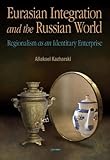Eurasian Integration and the Russian World : Regionalism as an Identitary Enterprise / Aliaksei Kazharski.
Material type: TextPublication details: Budapest ; New York : Central European University Press, (c)2019.Description: 1 online resource (208 pages)Content type:
TextPublication details: Budapest ; New York : Central European University Press, (c)2019.Description: 1 online resource (208 pages)Content type: - text
- computer
- online resource
- 9633862868
- JN6693 .E973 2019
- COPYRIGHT NOT covered - Click this link to request copyright permission: https://lib.ciu.edu/copyright-request-form
| Item type | Current library | Collection | Call number | URL | Status | Date due | Barcode | |
|---|---|---|---|---|---|---|---|---|
 Online Book (LOGIN USING YOUR MY CIU LOGIN AND PASSWORD)
Online Book (LOGIN USING YOUR MY CIU LOGIN AND PASSWORD)
|
G. Allen Fleece Library ONLINE | Non-fiction | JN6693.5.43 (Browse shelf(Opens below)) | Link to resource | Available | on1182846440 |
Browsing G. Allen Fleece Library shelves, Shelving location: ONLINE, Collection: Non-fiction Close shelf browser (Hides shelf browser)
Includes bibliographies and index.
Cover; Title page; Copyright page; Table of Contents; Acknowledment; Foreword by Viatcheslav Morozov; Introduction; Chapter 1: Regionalism as a Russian Identity-Building Project; Chapter 2: The Post-Soviet as Postmodern? Theorizing Identitary Discourses in Russia; Chapter 3: The Language of Civilizations in Post-Soviet Russia; Chapter 4: A "Russian Civilization": Constructing Unity across Fragmentation; Chapter 5: Cultural Regionalism as a Non-Western Model of Global Order; Chapter 6: Toward a "Eurasian Union"? Economic Regionalism and Reconstitution of Russian Identity
Chapter 7: Eurasian Regionalism and the European Union: New Uses for the Old OtherConclusion; References; Index
This volume examines Russian discourses of regionalism as a source of identity construction practices for the country's political and intellectual establishment. The overall purpose of the monograph is to demonstrate that, contrary to some assumptions, the transition trajectory of post-Soviet Russia has not been towards a liberal democratic nation state that is set to emulate Western political and normative standards. Instead, its foreign policy discourses have been constructing Russia as a supranational community which transcends Russia's current legally established borders. The study underta.
COPYRIGHT NOT covered - Click this link to request copyright permission:
There are no comments on this title.







